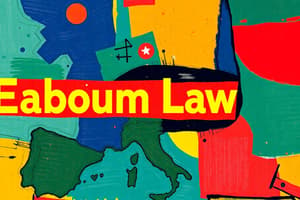Podcast
Questions and Answers
What is the primary purpose of labour law?
What is the primary purpose of labour law?
- To mediate disputes between employees and trade unions
- To promote the rights of employers
- To regulate the employment relationship between employers and employees (correct)
- To establish a minimum wage for all employees
What is a key source of labour law?
What is a key source of labour law?
- Trade union agreements
- Employment contracts
- Government policies
- International labour standards (correct)
What is an employment contract?
What is an employment contract?
- A verbal agreement between an employer and employee
- A contract between an employer and a trade union
- A mutually binding agreement outlining terms and conditions of employment (correct)
- A government regulation governing employment
What is a key duty of an employer?
What is a key duty of an employer?
What right is protected by labour law?
What right is protected by labour law?
What is not a source of labour law?
What is not a source of labour law?
What is the primary focus of the 'right to safe work environment'?
What is the primary focus of the 'right to safe work environment'?
What type of employment typically has a limited duration and often lacks benefits?
What type of employment typically has a limited duration and often lacks benefits?
What is the term for termination due to employee misconduct, poor performance, or breach of contract?
What is the term for termination due to employee misconduct, poor performance, or breach of contract?
What is the purpose of a labour tribunal?
What is the purpose of a labour tribunal?
What is the term for internal processes for resolving workplace disputes and complaints?
What is the term for internal processes for resolving workplace disputes and complaints?
Which of the following is NOT a fundamental right of employees?
Which of the following is NOT a fundamental right of employees?
Flashcards are hidden until you start studying
Study Notes
Definition and Purpose
- Labour law, also known as employment law, is a body of laws, regulations, and precedents that govern the relationship between employers and employees
- Its purpose is to protect the rights of employees, promote fair labour practices, and regulate the employment relationship
Sources of Labour Law
- Statutory law: enacted by legislative bodies, e.g. Labour Codes, Acts, and Regulations
- Common law: judge-made law, based on court decisions and precedents
- Collective agreements: negotiated between employers and trade unions
- International labour standards: set by organizations like the International Labour Organization (ILO)
Key Concepts
- Employment contract: a mutually binding agreement between an employer and employee, outlining terms and conditions of employment
- Terms and conditions: including wages, hours of work, leave, and job security
- Employer's duties: obligations to provide a safe work environment, prevent discrimination, and comply with labour laws
- Employee's duties: obligations to perform work duties, follow employer's instructions, and maintain confidentiality
Employment Rights
- Freedom from discrimination: protection against discrimination based on race, gender, age, etc.
- Right to fair wages: entitlement to minimum wage, equal pay, and fair compensation
- Right to safe work environment: protection from hazardous working conditions and occupational health risks
- Right to unionize and collective bargaining: freedom to form trade unions and engage in collective bargaining
Types of Employment
- Full-time employment: regular, ongoing employment with set hours and benefits
- Part-time employment: less than full-time hours, with varying benefits
- Temporary or casual employment: limited-duration employment, often without benefits
- Contract employment: fixed-term employment, often with specific duties and responsibilities
Termination of Employment
- Just cause: termination due to employee misconduct, poor performance, or breach of contract
- Unjust dismissal: termination without just cause, potentially leading to legal action
- Notice periods: required notice periods before termination, varying by jurisdiction and employment type
Labour Disputes and Resolution
- Grievance procedures: internal processes for resolving workplace disputes and complaints
- Arbitration: neutral, third-party resolution of labour disputes
- Labour tribunals: specialized courts or bodies for resolving labour disputes and enforcing labour laws
Definition and Purpose of Labour Law
- Labour law is a body of laws, regulations, and precedents governing the relationship between employers and employees
- Its purpose is to protect employees' rights, promote fair labour practices, and regulate the employment relationship
Sources of Labour Law
- Statutory law: enacted by legislative bodies, such as Labour Codes, Acts, and Regulations
- Common law: judge-made law based on court decisions and precedents
- Collective agreements: negotiated between employers and trade unions
- International labour standards: set by organizations like the International Labour Organization (ILO)
Employment Contract and Terms
- An employment contract is a mutually binding agreement between an employer and employee, outlining terms and conditions of employment
- Terms and conditions include wages, hours of work, leave, and job security
Employer and Employee Duties
- Employer's duties: provide a safe work environment, prevent discrimination, and comply with labour laws
- Employee's duties: perform work duties, follow employer's instructions, and maintain confidentiality
Employment Rights
- Freedom from discrimination: protection against discrimination based on race, gender, age, etc.
- Right to fair wages: entitlement to minimum wage, equal pay, and fair compensation
- Right to safe work environment: protection from hazardous working conditions and occupational health risks
- Right to unionize and collective bargaining: freedom to form trade unions and engage in collective bargaining
Types of Employment
- Full-time employment: regular, ongoing employment with set hours and benefits
- Part-time employment: less than full-time hours, with varying benefits
- Temporary or casual employment: limited-duration employment, often without benefits
- Contract employment: fixed-term employment, often with specific duties and responsibilities
Termination of Employment
- Just cause: termination due to employee misconduct, poor performance, or breach of contract
- Unjust dismissal: termination without just cause, potentially leading to legal action
- Notice periods: required notice periods before termination, varying by jurisdiction and employment type
Labour Disputes and Resolution
- Grievance procedures: internal processes for resolving workplace disputes and complaints
- Arbitration: neutral, third-party resolution of labour disputes
- Labour tribunals: specialized courts or bodies for resolving labour disputes and enforcing labour laws
Studying That Suits You
Use AI to generate personalized quizzes and flashcards to suit your learning preferences.




